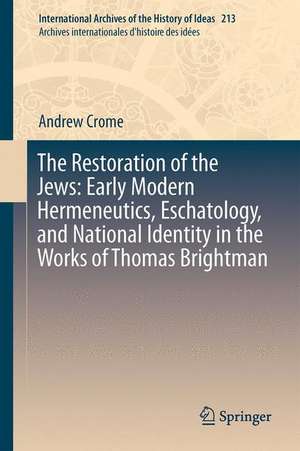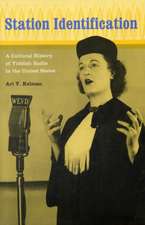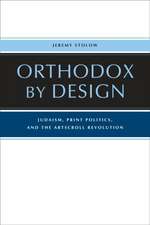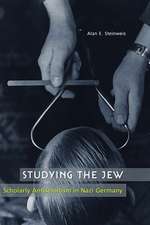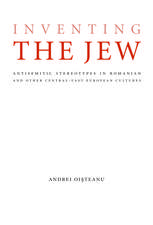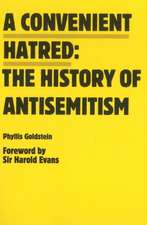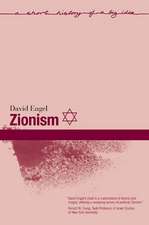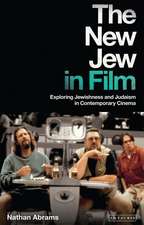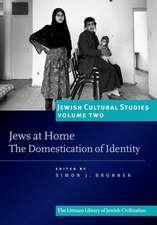The Restoration of the Jews: Early Modern Hermeneutics, Eschatology, and National Identity in the Works of Thomas Brightman: International Archives of the History of Ideas Archives internationales d'histoire des idées, cartea 213
Autor Andrew Cromeen Limba Engleză Hardback – 19 mai 2014
This important study provides a new examination of Thomas Brightman's hermeneutical method, particularly his ideas on the restoration of the Jews. The author's thorough analysis ofBrightman's approach also has more general and wider implications for understanding the development of English apocalyptic interpretation into the later seventeenth-century.' - Dr Warren Johnston, Associate Professor of History, Algoma University.
Andrew Crome's ground-breaking study of Thomas Brightman offers a new and sometimes surprising account of the development of millennial thinking in and beyond early modern England. This masterly account demonstrates the extent to which an emerging Zionism supported an emerging English nationalism, while outlining the historical roots of some of the most important of contemporary geopolitical themes." - Professor Crawford Gribben, Professor of Early Modern British History, Queen's University Belfast.
This important study provides a new examination of Thomas Brightman's hermeneutical method, particularly his ideas on the restoration of the Jews. The author's thorough analysis of Brightman's approach also has more general and wider implications for understanding the development of English apocalyptic interpretation into the later seventeenth-century.' - Dr Warren Johnston, Associate Professor of History, Algoma University.
| Toate formatele și edițiile | Preț | Express |
|---|---|---|
| Paperback (1) | 386.00 lei 43-57 zile | |
| Springer International Publishing – 3 sep 2016 | 386.00 lei 43-57 zile | |
| Hardback (1) | 393.35 lei 43-57 zile | |
| Springer International Publishing – 19 mai 2014 | 393.35 lei 43-57 zile |
Din seria International Archives of the History of Ideas Archives internationales d'histoire des idées
- 24%
 Preț: 679.97 lei
Preț: 679.97 lei - 18%
 Preț: 728.43 lei
Preț: 728.43 lei -
 Preț: 380.25 lei
Preț: 380.25 lei -
 Preț: 382.18 lei
Preț: 382.18 lei -
 Preț: 382.36 lei
Preț: 382.36 lei -
 Preț: 385.84 lei
Preț: 385.84 lei -
 Preț: 381.43 lei
Preț: 381.43 lei -
 Preț: 380.45 lei
Preț: 380.45 lei - 18%
 Preț: 1218.35 lei
Preț: 1218.35 lei -
 Preț: 379.68 lei
Preț: 379.68 lei -
 Preț: 399.29 lei
Preț: 399.29 lei - 18%
 Preț: 950.03 lei
Preț: 950.03 lei -
 Preț: 385.08 lei
Preț: 385.08 lei - 18%
 Preț: 953.20 lei
Preț: 953.20 lei - 15%
 Preț: 648.24 lei
Preț: 648.24 lei - 15%
 Preț: 641.03 lei
Preț: 641.03 lei - 18%
 Preț: 954.93 lei
Preț: 954.93 lei - 18%
 Preț: 944.19 lei
Preț: 944.19 lei - 15%
 Preț: 643.00 lei
Preț: 643.00 lei - 18%
 Preț: 1825.40 lei
Preț: 1825.40 lei - 18%
 Preț: 1224.54 lei
Preț: 1224.54 lei - 15%
 Preț: 644.63 lei
Preț: 644.63 lei - 15%
 Preț: 633.53 lei
Preț: 633.53 lei - 15%
 Preț: 647.08 lei
Preț: 647.08 lei - 18%
 Preț: 1233.06 lei
Preț: 1233.06 lei -
 Preț: 390.25 lei
Preț: 390.25 lei - 18%
 Preț: 945.92 lei
Preț: 945.92 lei - 18%
 Preț: 951.91 lei
Preț: 951.91 lei - 18%
 Preț: 1219.63 lei
Preț: 1219.63 lei - 15%
 Preț: 638.24 lei
Preț: 638.24 lei - 18%
 Preț: 1223.43 lei
Preț: 1223.43 lei
Preț: 393.35 lei
Nou
Puncte Express: 590
Preț estimativ în valută:
75.29€ • 81.81$ • 63.29£
75.29€ • 81.81$ • 63.29£
Carte tipărită la comandă
Livrare economică 21 aprilie-05 mai
Preluare comenzi: 021 569.72.76
Specificații
ISBN-13: 9783319047614
ISBN-10: 3319047612
Pagini: 256
Ilustrații: XIII, 242 p.
Dimensiuni: 155 x 235 x 19 mm
Greutate: 0.54 kg
Ediția:2014
Editura: Springer International Publishing
Colecția Springer
Seria International Archives of the History of Ideas Archives internationales d'histoire des idées
Locul publicării:Cham, Switzerland
ISBN-10: 3319047612
Pagini: 256
Ilustrații: XIII, 242 p.
Dimensiuni: 155 x 235 x 19 mm
Greutate: 0.54 kg
Ediția:2014
Editura: Springer International Publishing
Colecția Springer
Seria International Archives of the History of Ideas Archives internationales d'histoire des idées
Locul publicării:Cham, Switzerland
Public țintă
ResearchCuprins
Introduction.- Chapter 1: The Literal Sense, Apocalypse and the Jews in History.- Chapter 2: Historicising Allegory: Thomas Brightman and the Historicising Commentary.- Chapter 3: Consistent Literalism and the Restoration of the Jews.- Chapter 4: Tracing Brightman’s Influence: Judeo-Centrism 1610-40.- Chapter 5: Tracing Brightman’s Influence: Judeo-Centrism 1640-60.- Conclusion.- Appendix: Comparison of editions of Brightman’s commentaries.
Notă biografică
Andrew Crome is Lecturer in the History of Modern Christianity at the University of Manchester.
Textul de pe ultima copertă
This book offers the first detailed examination of the life and works of biblical commentator Thomas Brightman (1562-1607), analysing his influential eschatological commentaries and their impact on both conservative and radical writers in early modern England. It examines in detail the hermeneutic strategies used by Brightman and argues that his method centred on the dual axes of a Jewish restoration to Palestine and the construction of a strong English national identity. This book suggests that Brightman’s use of conservative modes of “literal” exegesis led him to new interpretations which had a major impact on early modern English eschatology. A radically historicised mode of exegesis sought to provide interpretations of the Old Testament that would have made sense to their original readers, leading Brightman and those who followed him to argue for the physical restoration of the Jews to the Holy Land. In doing so, the standard Reformed identification of Old Testament Israel with elect Christians was denied. This book traces the evolution of the controversial idea that Israel and the church both had separate unfulfilled scriptural promises in early modern England and shows how early modern exegetes sought to re-construct a distinctly English Christian identity through reading their nation into prophecy. In examining Brightman’s hermeneutic strategies and their influence, this book argues for important links between a “literal” hermeneutic, ideas of Jewish restoration and national identity construction in early modern England. Its central arguments will be of interest to all those researching the history of biblical interpretation, the role of religion in constructing national identity and the background to the later development of Christian Zionism.
Much has been written about seventeenth-century English apocalyptic thought, but Crome's patient and judicious analysis of Thomas Brightman breaksnew ground. It succeeds in laying bare the hermeneutical logic that fuelled the rise of Reformed Judeo-centric millennialism. The book deserves a wide readership among scholars concerned with the history of biblical interpretation, Protestant eschatology, English national identity, and Christian Zionism'. - Professor John Coffey, Professor of Early Modern History, University of Leicester
Andrew Crome's ground-breaking study of Thomas Brightman offers a new and sometimes surprising account of the development of millennial thinking in and beyond early modern England. This masterly account demonstrates the extent to which an emerging Zionism supported an emerging English nationalism, while outlining the historical roots of some of the most important of contemporary geopolitical themes." - Professor Crawford Gribben, Professor of Early Modern British History, Queen's University Belfast
This important study provides a new examination of Thomas Brightman's hermeneutical method, particularly his ideas on the restoration of the Jews. The author's thorough analysis of Brightman's approach also has more general and wider implications for understanding the development of English apocalyptic interpretation into the later seventeenth-century.' - Dr Warren Johnston, Associate Professor of History, Algoma University
Much has been written about seventeenth-century English apocalyptic thought, but Crome's patient and judicious analysis of Thomas Brightman breaksnew ground. It succeeds in laying bare the hermeneutical logic that fuelled the rise of Reformed Judeo-centric millennialism. The book deserves a wide readership among scholars concerned with the history of biblical interpretation, Protestant eschatology, English national identity, and Christian Zionism'. - Professor John Coffey, Professor of Early Modern History, University of Leicester
Andrew Crome's ground-breaking study of Thomas Brightman offers a new and sometimes surprising account of the development of millennial thinking in and beyond early modern England. This masterly account demonstrates the extent to which an emerging Zionism supported an emerging English nationalism, while outlining the historical roots of some of the most important of contemporary geopolitical themes." - Professor Crawford Gribben, Professor of Early Modern British History, Queen's University Belfast
This important study provides a new examination of Thomas Brightman's hermeneutical method, particularly his ideas on the restoration of the Jews. The author's thorough analysis of Brightman's approach also has more general and wider implications for understanding the development of English apocalyptic interpretation into the later seventeenth-century.' - Dr Warren Johnston, Associate Professor of History, Algoma University
Caracteristici
Examines Thomas Brightman, a figure often cited in secondary works but rarely examined in detail Presents important new insights on the development of early modern ideas of Jewish restoration to Palestine Provides a detailed analysis of early modern apocalyptic hermeneutics and their links to national identity formation Includes supplementary material: sn.pub/extras
